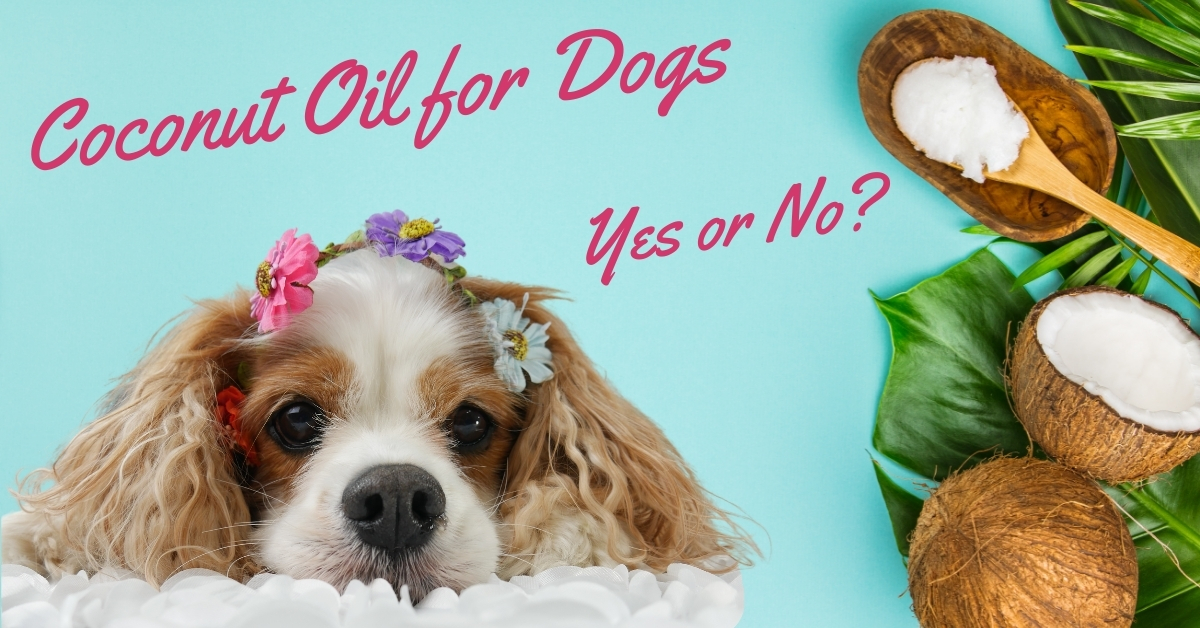Google Adsense—>

Coconut Oil for Dogs

Have you heard all the hype about coconut oil for dogs? Do the possible benefits of coconut oil for dogs come with any health risks or concerns? Is coconut oil safe for all dogs? Today, I wanted to dive into coconut oil for dogs. As with anything you read or hear, it’s important to do your due diligence before jumping feet first.
Coconut Oil for Dogs: Side Effects and Risk Factors
I thought it would be best to start with any risk factors of giving coconut oil to your dogs before chatting about the health benefits of coconut oil for dogs. The last thing I want is for a loving dog parent to give their dog coconut oil to help with an issue prior to learning about any possible side effects. That said, I firmly believe in talking with your dog’s holistic veterinarian prior to adding any new supplements into his care.
I spoke with Sarah Wooten, DVM, CVJ, and she noted coconut oil isn’t a good option for all dogs. “Some dogs should not be given coconut oil orally. If a dog has a history of pancreatitis (inflammation of the pancreas) or a dog is already heavy, then avoid giving coconut oil by mouth and only use topically.”
Dr. Karen Becker has this to say about coconut oil and dogs with pancreatitis, “With regard to coconut oil and pets who need low-fat diets, for example, animals with lymphangiectasia or protein-losing enteropathy (PLE), irritable bowel syndrome (IBS), or inflammatory bowel disease (IBD) — you can absolutely put these patients on a low-fat diet and use coconut oil or MCTs as their source of therapeutic fats to help with those medical conditions.”
This just confirms that when your dog has a medical issue it is important to work closely with his holistic veterinarian. Have a heart-to-heart discussion on which supplements would be beneficial and which ones to avoid.
Nicholas DeRoma CVT, noted that “Coconut oil lacks essential fatty acids; therefore it does not make a sufficient fat source.” This is important to note when you are balancing your dog’s raw or fresh food diet. Coconut oil has approximately 81 mg of Omega-6 fatty acids per teaspoon.
Benefits of Coconut Oil for Dogs
When I spoke with Sarah Wooten, DVM, CVJ, she explained, “Coconut oil is mostly saturated medium-chain triglyceride fats called MCTs.” When I asked her about ways a dog parents can use coconut oil with their dogs, she offered these ideas.
- Skin Benefits: Anecdotally, pet owners report that topical application of coconut oil to the skin can help with allergies, insect bites or stings, seborrhea, and itchy, dry skin. Some owners also report that it reduces dog odor and makes coats shiny and sleek.
- Digestion: Some pet owners report that coconut aids in digestion, benefits the microbiome (gut bacteria), and improves mental function in geriatric dogs.
- Metabolism: Some pet owners use coconut oil to boost their dogs’ metabolism and facilitate weight loss.
- Boost Immunity: Coconut oil contains lauric acid, which is shown in human studies to have in vitro antibacterial and antiviral effects against a wide range of bacteria, viruses, and biofilms.
Sarah Wooten, DVM, CVJ also noted, “There are no studies available in dogs, however, some owners use coconut oil for these purposes with some degree of success in their dogs.” She continued to caution, “ As a veterinarian, I have not seen coconut oil be effective in eliminating bacterial infections, and I have seen some poor owners make their dog much worse by using coconut oil for a skin infection vs. take their dog to the vet for antibiotics, so be aware.”
Have I mentioned how important it is to work with your dog’s veterinarian vs. trying to fix things on your own?
Tips for Giving Your Dog Coconut Oil
Sarah Wooten, DVM, CVJ offered this advice, “If you are going to use coconut oil in or on your dog, then start slow. You can rub coconut oil into the skin and then rinse your dog off using a gentle shampoo if your dog feels greasy. If you are going to give coconut oil to your dog to eat, start with very small amounts, a teaspoon for big dogs, a 1/4 teaspoon for small dogs. If your dog develops diarrhea or gas, then reduce or stop the coconut oil.”
Final Thoughts
Remember to talk with your dog’s veterinarian, start slow, and use moderation and rotation. If you and your dog’s vet decide coconut oil is a good natural remedy, you may want to consider rotating your coconut oil regimen with another natural regime. When in doubt, leave it out.
Your questions or comments are welcome below.
Are you looking for even more ways to stay up to date with Raising Your Pets Naturally? Sign up for the newsletter for more tips and promotions. Don’t forget to be social and Like, Follow and Subscribe. Comments below are always welcome.
Facebook Twitter Pinterest Instagram YouTube
 |

If you found my blog helpful, please consider a small contribution. Dexter and I thank you! |
Google Adsense—>




